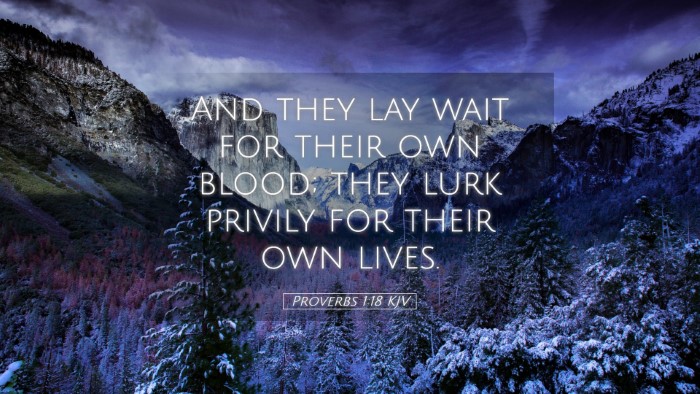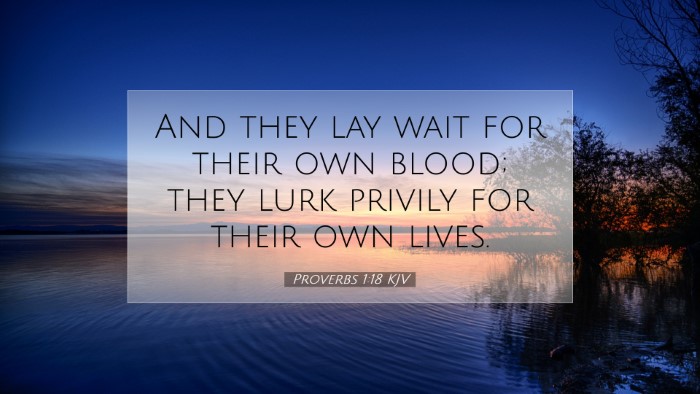Commentary on Proverbs 1:18
"But they lie in wait for their own blood; they lurk secretly for their own lives." (Proverbs 1:18)
Introduction
The Book of Proverbs is a treasure trove of wisdom, providing practical insights for daily living rooted in a fear of the Lord. Proverbs 1:18 serves as a warning about the consequences of engaging in schemes of violence and destruction. This commentary will draw from the insights of Matthew Henry, Albert Barnes, and Adam Clarke to explore the depths of this verse.
Exegesis of the Verse
In this verse, Solomon articulates a profound truth about human behavior, especially regarding the wicked. The phrase "they lie in wait for their own blood" can be interpreted to mean that those who plot against others ultimately bring ruin upon themselves. The imagery reflects a deep-seated moral truth prevalent throughout Scripture: evil schemes lead to self-destruction.
Insights from Matthew Henry
Henry notes that the emphasis on lying in wait signifies a premeditated desire to harm others. He poignantly remarks that while the wicked may think they are securing their gain, they are, in fact, ensnaring themselves in a trap of their own making. The allure of sin is likened to a bait that ultimately leads to death.
- Moral Consequences: Henry emphasizes that the intent behind malicious actions matters. Those who plan harm do so at the expense of their own lives and well-being.
- The Deceptive Nature of Sin: He warns that sin often appears attractive, leading individuals to believe they can escape its consequences, which is particularly dangerous.
- Spiritual Blindness: The wicked's blindness to their own peril is a recurring theme—illustrating how sin distorts understanding and judgment.
Reflections by Albert Barnes
Barnes provides a detailed analysis of how this proverb underlines the inevitable outcome for those who engage in villainous acts. He points out that the pursuit of unrighteous gains not only jeopardizes others but invariably leads to the aggressor’s own demise.
- Self-destruction: Barnes states that those who exploit others are themselves exploited by their own schemes, leading to self-inflicted harm.
- The Nature of Evil: He elaborates on the idea that evil begets evil; hence, those who intend to harm others create a cycle of destruction.
- Call to Wisdom: Finally, Barnes calls readers to embrace wisdom—which is the antithesis of the behaviors depicted in the verse—to avoid such destructive paths.
Adam Clarke's Interpretation
Clarke presents a holistic perspective on Proverbs 1:18, emphasizing the dangers of associating with the wicked. He contends that not only do malicious intentions impede personal morality, but they also pose spiritual risks that can separate individuals from divine favor.
- The Spiritual Implications of Sin: Clarke stresses that sins have spiritual repercussions, not just earthly consequences.
- The Foolishness of Violence: He highlights the folly of thinking oneself invincible when plotting against others—a mindset that leads to catastrophic outcomes.
- Encouragement to Choose Righteousness: Clarke exhorts readers to seek wisdom and understanding instead, guiding them toward a path of life and fulfillment.
Theological Themes
This verse reveals significant theological truths that resonate across both the Old and New Testaments:
- The Law of Retribution: The concept of reaping what one sows is prevalent throughout Scripture, stressing the inevitable repercussions of sin.
- The Pursuit of Wisdom: The continual call to pursue wisdom in Proverbs affirms that true understanding leads to life and righteousness.
- The Human Condition: The deceitfulness of sin is an ever-present theme; it highlights humanity's inclination toward folly, reinforcing the need for divine guidance.
Practical Applications
For pastors, students, and scholars, Proverbs 1:18 serves as a sobering reminder of the nature of sin and its consequences. Here are several practical applications:
- Reflection on Motivations: Individuals should scrutinize their motives and intentions; self-examination can prevent falling into destructive patterns.
- Educating on the Nature of Evil: Pastoral teachings should focus on the nature of sin and its consequences, encouraging congregants to seek wisdom instead of folly.
- Encouragement to Pursue Righteousness: Churches should promote a culture that values wisdom, righteousness, and godliness, steering clear from the temptations of the world.
Conclusion
Proverbs 1:18 serves as a potent reminder of the inherent dangers in scheming for one's gain at the expense of others. Insights from commentators like Matthew Henry, Albert Barnes, and Adam Clarke shed light on the profound implications of this verse. It underscores the principle that true wisdom involves recognizing the futility of sin and embracing a life aligned with divine truth. Ultimately, the pursuit of wisdom leads to life, while the path of the wicked brings about self-inflicted ruin.


